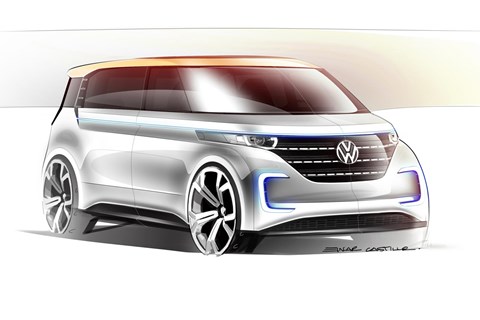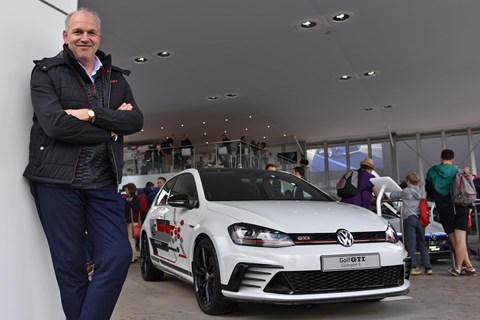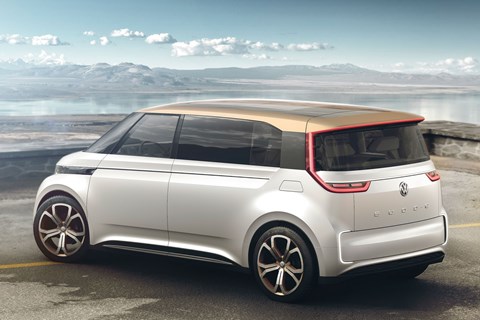► New mid-size electric VW concept set for Paris reveal
► Latest MEB architecture to underpin upcoming EVs
► Increased focus on autonomy, connectivity and mobility services
A mid-size electric Volkswagen with a minimum 250-mile zero-emissions range will usher in the third age of the people’s car, according to the company’s latest announcement.
VW will show a thinly disguised concept at the upcoming Paris motor show, on 29 September 2016, under the banner ‘Think New’. It will be followed by other VW EV concepts at all of 2017’s big auto shows, previewing a family of electric cars that will start production by late 2019.
Tell me more about this upcoming EV concept…
The Paris car is being touted as the third definition of the people‘s car, following the Beetle that put Germany on wheels, and the Golf that defined today’s middle-class family hatch.
VW sales and marketing chief, Jürgen Stackmann, said: ‘At Paris, we will open up a new chapter for the brand. This car doesn’t mean the end for the Golf – that has a strong future – but we will be focusing on leveraging technology and the change in the company to open a new chapter.’

The Volkswagen Group, as it rebuilds its brand one year on from the dieselgate scandal breaking, has outlined its plans to be a global leader in electric cars – selling 2-3 million EVs a year by 2025, accounting for potentially one in every four or five vehicles it retails.
What platform will the new cars be based on?
Many of them will be underpinned by a new electric car architecture, codenamed MEB, which can roll down the same line ‘bumper to bumper’ with existing models such as the Golf, and share its front and rear suspension set-up.
The MEB platform houses the battery low down between the axles, to drop the centre of gravity. And the architecture will be usefully modular and free up space for the occupant, promises Christian Senger, who is leading the e-mobility vehicle project.
Senger says: ‘To increase battery space, increase the wheelbase and shorten the overhangs: this creates more rear legroom, more space in the front, and gives our designers complete freedom.’
Indeed, VW promises the Paris car and its peers will not be rational designs – far from it. ‘Electric cars have to be highly emotional, highly engaging, yelling: “I’m an object of desire”,” vows Stackmann.

Senger also revealed that while 400km (approximately 250 miles) of range will be the baseline – suitable for ‘normal life’ – bigger battery packs will offer 600km (373 miles) to entice those with longer commutes and to ensure decent battery range in harsher climates. A spectrum of power outputs will be available, to offer models with a performance edge, much like Tesla’s P85D and P90D ethos.
Volkswagen expects the electric car’s premium to come down to the equivalent of today’s diesel cars, as tech advances and economies of scale kick in. ‘Getting down the battery cost is the most important thing we are working on,’ says Senger.
What else is Volkswagen looking at?
The company’s vision isn’t restricted to zero-emissions powertrains. VW also wants to unleash the benefits of connectivity and autonomy to its customers. It wants to turn the 40 million Volkswagen owners into a Connected Community, which would offer obvious benefits with incredibly precise real-time traffic jam information and potential hazards relayed down the chain of connected cars.
Senger promises the e-VWs will be online around the clock, potentially using its sensors to contribute to society by monitoring free parking spaces. Over-the-air software updates will keep capabilities fresh.

VW is also aiming for the vision of ‘level five’ autonomy. According to Stackmann, ‘the dream the [self-driving] car will do whatever you need it to do in numerous environments.’ Company experts reckon the average person spends 4.8 years of their life on the road, and the goal is to make that time more productive for drivers who can work, surf the web or watch videos.
In the meantime, VW promises to exploit the benefits from interim autonomous stages too, building on today’s self-parking and motorway cruising capabilities.
And of course, VW will push into mobility services such as car sharing (it has paid $300m for a stake in Uber-rival Gett). The group is considering a future where the bulk of cars aren’t owned but shared and rented by the mile or minute, with you unlocking them by smartphone. Start it by logging in, thereby getting access to all your personal preferences from touchscreen configuration to climate to favourite destinations, contacts and so on.
It all adds up to a step change at Volkswagen, as the German giant changes tack to bounce back from dieselgate. Stackmann adds: ‘We want to be a major player in electromobility, autonomy and connectivity going forward. We believe we have the knowledge, power and potential to become a leader.’
Read more CAR tech news and features